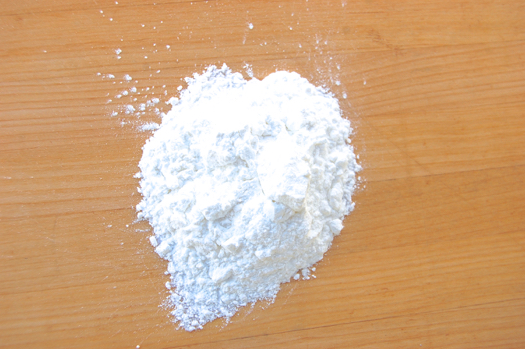Baking Powder

Baking powder is a leavening reaction in a can. It’s a combination of baking soda (sodium bicarbonate) and at least one other acid, usually two, and then a little cornstarch to absorb any moisture and prevent the reaction from happening prematurely. As you might expect it’s the combination of acids that determine the way the baking powder performs, since different acids react with the soda in different ways depending on the conditions.
The big advantage of baking powder over baking soda isn’t its convenience, it’s its functionality. For unlike plain soda that generally reacts quickly with whatever common kitchen acids are at hand, baking powder reacts over time, creating bubbles early in the mixing step when it gets wet and later in the baking step when it gets hot (these are the two actions in “double acting” baking powder). The result is a steady rise that doesn’t peter out too soon or go off all at once causing a rapid expansion and then a collapse.
A typical grocery store baking powder contains one fast-reacting acid that produces bubbles in the mixing step and one slow-reacting acid that does the same thing in the mixing step. The fast-reacting acid can be cream of tartar (potassium bitartrate) but most often is mono calcium phosphate (MCP). The slow-reacting acid is usually either sodium acid pyrophosphate (SAPP), sodium aluminum phosphate (SALP) or sodium aluminum sulfate (SAS). Sometimes you’ll see a combination on the ingredient label. Industrial baking powders can have very different formulas since food manufacturers often need to produce highly specific leavening effects.
Most kitchen baking powders are a little less than a third baking soda, which means that they have between 1/4 and 1/3 the potency of pure baking soda. I generally think of baking powder as having 1/4 the strength and so far that assumption hasn’t resulted in any baking mishaps. You can make your own less sophisticated baking powder by combining cream of tartar and baking soda 2-1.
Years ago, I used to see a brand of baking powder that advertised itself as “All Phosphate, No Alum”. I don’t suppose you have any clue as to what the virtue of that was supposed to be. I always wondered.
Hey Calamity!
The idea there was that there was no aluminum in it (alum is potassium aluminum sulfate), which at the time was though to cause Alzheimer’s. So that’s the reason it was called out on the label. Thanks for the question!
Cheers,
– Joe